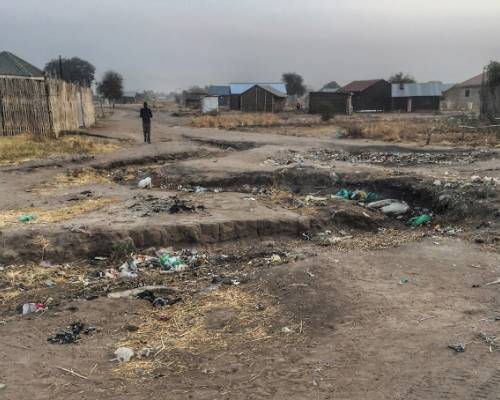Travelling to South Sudan? Update on spread of diseases
11 September 2016 - RPS Partnership
Anyone travelling to South Sudan at present should be aware of the recent outbreak of infectious diseases. contact [email protected] for more information and training courses to enable you to work there safely.
We offer Hostile Environment Awareness Training, sometimes called Hostile Environment Training and HEAT as well as HET. This is our speciality. We can provide these courses, together with Emergency First Aid directed to the types of injuries and trauma that you may be faced with in this region at the moment.
WHO (World Health Organisation) brings us this update of diseases in the region. Consider updating your innoculations prior to travel.
Infectious diseases continue to pose a major public health threat in South Sudan. Adding to the chronic burden of disease, regular outbreaks further threaten people's health. Read the full article here.
In a conflict setting, WHO and partners are responding to multiple outbreaks including cholera, malaria, measles, suspected hemorrhagic fever, and kala-azar.
“In spite of the insecurity, WHO is taking every opportunity to ensure that we reach the people with health care services to protect them at this time when the health system has crumbled,” says Dr, Abdulmumini Usman, WHO Representative to South Sudan.
Displaced people risk cholera
Cholera was confirmed in Juba on 21 July 2016 in the aftermath of the recent escalation of violence in Juba where clashes between the military and opposition forces resulted in hundreds of people dead and thousands displaced. As of 6 September 2016, a total of 1762 cholera cases, including 26 deaths had been reported from five states: Juba, Terekeka, Jonglei, Eastern Lakes and Imatong.
WHO is working with partners to respond to the cholera outbreak, including treating approximately 1700 cholera patients and sending health promoters to visit around 88 000 households with prevention messages and items such as water purification tablets, oral rehydration solution and soap. Additionally, WHO has participated in an extensive health promotion campaign which has reached over 2 million people countrywide with cholera prevention messages through radio talk shows, radio spots and interviews on 17 radio stations.
Malaria on the rise
More than 1.3 million malaria cases have been reported since the beginning of 2016. Malaria cases started rising in early May and, during the week of 30 May 2016, an outbreak was declared in Bentiu, a camp for internally displaced people. By 28 August 2016, 31 counties in 8 states had exceeded the malaria epidemic threshold countrywide. Since May, over 800 000 people have received treatment for malaria through static, outreach and mobile health teams. WHO has supported airlifting of malaria medicines and commodities and malnutrition kits to Northern Bahr el Ghazal, one of the most affected states, and has donated malaria medicines and commodities to affected areas in 6 other states.
Vaccination best protection against measles
Since the beginning of 2016, more than 1600 measles cases, including at least 19 deaths, have been reported countrywide. WHO has confirmed and responded to measles outbreaks in 12 counties. Since the fighting escalated in mid-2016, around 182 000 children have been vaccinated against measles. A follow-up campaign is planned for October 2016. Ensuring the majority of children receive vaccination is the best protection against this highly contagious disease.
Deadly disease spread by sandflies - Kala-azar is the most severe form of leishmaniasis, a disease spread by sandflies.
It causes fever, weight loss, anemia, enlargement of the spleen and liver, and is fatal if left untreated in most cases. The disease is endemic in parts of the country. In 2016, more than 1000 cases including 42 deaths have been reported in South Sudan. WHO co-leads the kala-azar taskforce and is supporting deployment of rapid response teams to affected areas. WHO also helps train health workers at treatment sites, provide weekly analysis of data and deployment of supplies such as rapid diagnostic kits and medicines to the treatment centres.
Disease detection important for fast response
Most of these infectious diseases have been controlled or eradicated from most parts of Africa but are still causing epidemics in South Sudan due to poor socio-economic conditions. When countries are struck by conflict or natural disasters, exacerbated by weak health systems, overcrowding and population displacement, they are most vulnerable to infectious disease outbreaks.
Adding to the challenge is the weakness of disease surveillance systems, making it hard to measure the true scope of the problem, or to allow for the early detection of outbreaks and appropriate response.
WHO supports the early warning alert and response system (EWARS), a network of static and mobile partner-supported reporting sites, to enhance detection of disease outbreaks in populations of humanitarian concern. There are now 58 EWARS reporting sites in South Sudan, and these sites will continue to be expanded to complement the existing surveillance system in areas affected by the crisis.
RPS Partnership advises that anyone travelling to this area MUST be well prepared. Ensure you are ready to face these and other diseases. Ensure you have the correct vaccinations PRIOR to travel and take the correct prophylaxis with you.
You should consider security training prior to travel and ensure that you take the right equipment with you. The local situation is constantly in flux and changes almost daily. This region is not for the faint hearted. There is ongoing fighting at times and outbreaks of violence are common.
You will need first aid equipment, as well as vital life saving equipment that you will learn about on our courses.
You should have robust contigency plans in place and ensure you have travel insurance that covers you for this country and region. Evacuation plans and crisis management plans are a "MUST". Contact us if you are not sure of if you need further advice or training.
Photo: Juba, South Sudan
With thanks to Mark Reading


